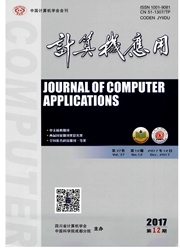

 中文摘要:
中文摘要:
针对柔性作业车间调度问题(FJSP),提出一种改进细菌觅食优化(IBFO)算法,该算法采用自适应调节步长的趋化操作,同时在趋化过程中,加强精英细菌对其他细菌在寻优方向上的引导作用,避免了算法早熟收敛;通过引入交叉和变异算子,以维持菌群的多样性,同时也提高了算法的全局搜索能力;采用自适应迁徙策略对精英细菌进行保护,提高了算法的全局收敛速度。最后,针对FJSP设计了合适的编码转化方案,并选用经典算例对其进行仿真实验:对于8×8和10×10两实例,改进后的细菌算法与标准细菌算法相比求解精度分别提高了2个单位时间和1个单位时间;对于Brandimarte标准测试集中的实例,IBFO算法的求解精度要普遍优于其他对比文献中的算法。仿真结果表明了IBFO算法可有效提高FJSP的求解精度。
 英文摘要:
英文摘要:
An Improved Bacteria Foraging Optimization( IBFO) algorithm was proposed to solve Flexible Job-shop Scheduling Problem( FJSP). Firstly,an adaptive chemotactic approach was designed to tackle the premature problems. The direction of chemotactic moving would be guided by the elite bacteria,and the individual with the best solution at current iteration. Secondly,crossover and mutation operators were not only introduced to increase the diversity of population,but also to enhance the global search capability. Thirdly,an adaptive migration strategy was adopted to protect the elite bacteria in order to improve the global convergence rate of the algorithm. And then an appropriate code conversion program was designed for FJSP. Lastly,a series of simulation experiments were carried out,for the examples of 8 × 8 and 10 × 10,the accuracy of the IBFO algorithm was improved two unit-times and one unit-time compared with the original Bacteria Foraging Optimization( BFO) algorithm; at the same time,for the FJSP instances from Brandimarte,the IBFO algorithm has a better precision than other algorithms from comparison documents. The simulation results of several benchmarks show that IBFO algorithm can increase the accuracy of solution when it is used to solve FJSP.
 同期刊论文项目
同期刊论文项目
 同项目期刊论文
同项目期刊论文
 期刊信息
期刊信息
